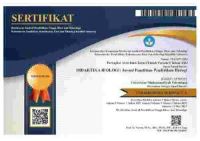LITERASI LINGKUNGAN MAHASISWA KEGURUAN
Abstract
Literasi lingkungan perlu dimiliki oleh generasi sekarang untuk keberlangsungan generasi yang akan datang, begitu juga dengan mahasiswa keguruan yang akan berperan mencerdaskan generasi mendatang. Penelitian ini menekankan pemahaman mahasiswa keguruan mengenai literasi lingkungan. Survei dilakukan terhadap 219 mahasiswa FKIP UAD dengan menggunakan angket. Teknik analisis data dilakukan secara deskriptif kuantitatif. Hasil penelitian menunjukkan bahwa pemahaman mahasiswa FKIP UAD terkait literasi lingkungan termasuk dalam kategori cukup, pemahaman literasi lingkungan mencakup 4 aspek yaitu kompetensi terhadap lingkungan, pengetahuan terhadap lingkungan, sikap terhadap lingkungan, serta perilaku dan tanggung jawab terhadap lingkungan. Literasi lingkungan yang dimiliki mahasiswa berkontribusi pada pelaksanaan program kampus hijau di UAD. Temuan tersebut menunjukkan perlu tindakan penguatan literasi lingkungan, sehingga tujuan dari agent of change, agent of development dan Agent of Modernizations pada mahasiswa dapat terbentuk.
Keywords
Full Text:
PDFReferences
Al – Omari, A. A., & Al khawaldeh, S. A. (2013). Environmental literacy among students of the faculty of education at Yarmouk. Journal of Educational and Psychological Studies [JEPS], 7(2), 133-150. https://doi.org/10.24200/jeps.vol7iss2pp133-150
Ardoin, N. M., Bowers, A. W., & Gaillard, E. (2020). Environmental education outcomes for conservation: A systematic review. Biological Conservation, 241, Article 108224. https://doi.org/10.1016/j.biocon.2019.108224
Arga, H. S. P., & Kuswendi, U. (2020). Internalizing environmental literacy of elementary students during covid-19 pandemic Proceedings of the 4th International Conference on Language, Literature, Culture, and Education (ICOLLITE 2020),
Aznar-Diaz, I., Hinojo-Lucena, F. J., Caceres-Reche, M. P., Trujillo-Torres, J. M., & Romero-Rodriguez, J. M. (2019). Environmental attitudes in trainee teachers in primary education. The future of biodiversity preservation and environmental pollution. Int J Environ Res Public Health, 16(3), Article 362. https://doi.org/10.3390/ijerph16030362
Bybee, R. W. (2008). Scientific literacy, environmental issues, and PISA 2006: The 2008 Paul F-Brandwein Lecture. Journal of Science Education and Technology, 17(6), 566-585. https://doi.org/10.1007/s10956-008-9124-4
Carlina, E., & Djukri, D. (2018). Science Project-based learning integrated with local potential to promote student’s environmental literacy skills. Advanced Journal of Social Science, 4(1), 1-7. https://doi.org/10.21467/ajss.4.1.1-7
Cutter, A., & Smith, R. (2001). Gauging primary school teachers’ environmental literacy: An issue of ‘priority’. Asia Pacific Education Review, 2(2), 45-60. https://doi.org/10.1007/bf03026290
Dada, D. O., Eames, C., & Calder, N. (2018). Impact of environmental education on beginning preservice teachers’ environmental literacy. Australian Journal of Environmental Education, 33(3), 201-222. https://doi.org/10.1017/aee.2017.27
Doerschuk, P., Bahrim, C., Daniel, J., Kruger, J., Mann, J., & Martin, C. (2016). Closing the gaps and filling the STEM pipeline: A multidisciplinary approach. Journal of Science Education and Technology, 25(4), 682-695. https://doi.org/10.1007/s10956-016-9622-8
Doup, M. L. (2018). Using an outdoor activity on local plant biodiversity to teach conservation ecology and promote environmentally responsible behaviors. The American Biology Teacher, 80(5), 359-364. https://doi.org/10.1525/abt.2018.80.5.359
Fidan, N. K., & Selanik Ay, T. (2016). Acquisition of operational environmental literacy in social studies course. International Journal of Environmental & Science Education, 11(13), 5951-5968. http://www.ijese.net/makale/755.html
Hermawan, I. M. S., Arjaya, I. B. A., & Diarta, I. M. (2022). BE-RAISE: A blended-learning model based on balinese local culture to enhance student’s environmental literacy. Jurnal Pendidikan IPA Indonesia, 11(4), 552-566. https://doi.org/10.15294/jpii.v11i4.39475
Hermawan, I. M. S., Suwono, H., Paraniti, A. A. I., & Wimuttipanya, J. (2022). Student’s environmental literacy: An educational program reflections for sustainable environment. JPBI (Jurnal Pendidikan Biologi Indonesia), 8(1), 1-9. https://doi.org/10.22219/jpbi.v8i1.16889
Hollweg, K. S., Taylor, J. R., Bybee, R. W., Marcinkowski, T. J., McBeth, W. C., & Zoido, P. (2011). Developing a framework for assessing environmental literacy. North American Association for Environmental Education. http://www.naaee.net
Hsu, C.-H. (2021). Environmental education: Revealing some current problems from personal opinion. Technium Social Sciences Journal, 22, 113-116. https://doi.org/10.47577/tssj.v22i1.4200
Joseph, C., Obrin Nichol, E., Janggu, T., & Madi, N. (2013). Environmental literacy and attitudes among Malaysian business educators. International Journal of Sustainability in Higher Education, 14(2), 196-208. https://doi.org/10.1108/14676371311312897
Kaya, V., & Elster, D. (2019). A critical consideration of environmental literacy: Concepts, contexts, and competencies. Sustainability, 11(6), Article 1581. https://doi.org/10.3390/su11061581
Krejcie, R. V., & Morgan, D. W. (1970). Determining Sample Size for Research Activities. Educational and Psychological Measurement, 30(3), 607-610. https://doi.org/10.1177/001316447003000308
Kuruppuarachchi, J., Sayakkarage, V., & Madurapperuma, B. (2021). Environmental literacy level comparison of undergraduates in the conventional and ODLs universities in Sri Lanka. Sustainability, 13(3), Article 1056. https://doi.org/10.3390/su13031056
Maknun, J., S. Barliana, M., Cahyani, D., Dalil H, N., & Dahar Minghat, A. (2018). Evaluation of vocational school (SMK) students’ environmental literacy. International Journal of Engineering & Technology, 7(4.33), 178-181. https://doi.org/10.14419/ijet.v7i4.33.23554
Mardiani, N. D., Husamah, H., Fatmawati, D., Miharja*, F. J., & Fauzi, A. (2021). Environmental literacy of students in Al-Rifa'ie modern islamic boarding school, Malang Regency-Indonesia based on gender differences and parents' occupation. Jurnal Pendidikan Sains Indonesia, 9(2), 317-328. https://doi.org/10.24815/jpsi.v9i2.19316
Ogunyemi, B., & Ifegbesan, A. P. (2022). Pre-service teachers’ disposition and attitude to environmental literacy in sanitation and waste management in a Nigerian university. Journal of Education in Black Sea Region, 8(1), 56-66. https://doi.org/10.31578/jebs.v8i1.277
Oncu, E. C., & Unluer, E. (2015). Environmental views and awareness of preschool teacher candidates. Procedia - Social and Behavioral Sciences, 174, 2653-2657. https://doi.org/10.1016/j.sbspro.2015.01.948
Ozgurler, S., & Cansaran, A. (2014). Graduate students, study of environmental literacy and sustainable development. International Electronic Journal of Environmental Education, 4(2). https://doi.org/10.18497/iejee-green.31036
Pe'er, S., Goldman, D., & Yavetz, B. (2007). Environmental literacy in teacher training: Attitudes, knowledge, and environmental behavior of beginning students. The Journal of Environmental Education, 39(1), 45-59. https://doi.org/10.3200/joee.39.1.45-59
Perusso, A., & Baaken, T. (2020). Assessing the authenticity of cases, internships and problem-based learning as managerial learning experiences: Concepts, methods and lessons for practice. The International Journal of Management Education, 18(3), Article 100425. https://doi.org/10.1016/j.ijme.2020.100425
Rosdiana, R., Maknun, D., & Roviati, E. (2020). The relationship between self efficacy and environmental literacy in pollution and environmental changes learning material. Biosfer: Jurnal Tadris Biologi, 11(2), 159-168. https://doi.org/10.24042/biosfer.v11i2.7337
Scholz, R. W. (2012). Environmental Literacy in Science and Society. https://doi.org/10.1017/cbo9780511921520
Suja, I. W., Redhana, I. W., & Amardini, N. A. (2021). Does parents’ work affect students’ environmental literacy in Bali, Indonesia? Proceedings of the First International Conference on Science, Technology, Engineering and Industrial Revolution (ICSTEIR 2020),
Svobodová, S. (2023). Environmental literacy of ISCED 2 pupils in Poland. Revija za elementarno izobraževanje, 16(1), 59-77. https://doi.org/10.18690/rei.16.1.1665
Wang, D. (2014). Research on the status of environmental education in China's Capital Universities. Selecting Peking University as a sample. Environmental Engineering and Management Journal, 13(5), 1079-1088. https://doi.org/10.30638/eemj.2014.113
Widiyanti, B. L., & Hartini, H. (2023). Environmental sanitation knowledge of environmental engineering’s students at Hamzanwadi University. IOP Conference Series: Earth and Environmental Science, 1190(1), Article 012007. https://doi.org/10.1088/1755-1315/1190/1/012007
DOI: https://doi.org/10.32502/dikbio.v7i2.5801
Copyright (c) 2023 Hani Irawati, Nani Aprilia, Much Fuad Saifuddin
Didaktika Biologi: Jurnal Penelitian Pendidikan Biologi is indexed by:

Didaktika Biologi: Jurnal Penelitian Pendidikan Biologi is licensed under a Creative Commons Attribution-ShareAlike 4.0 International License.







